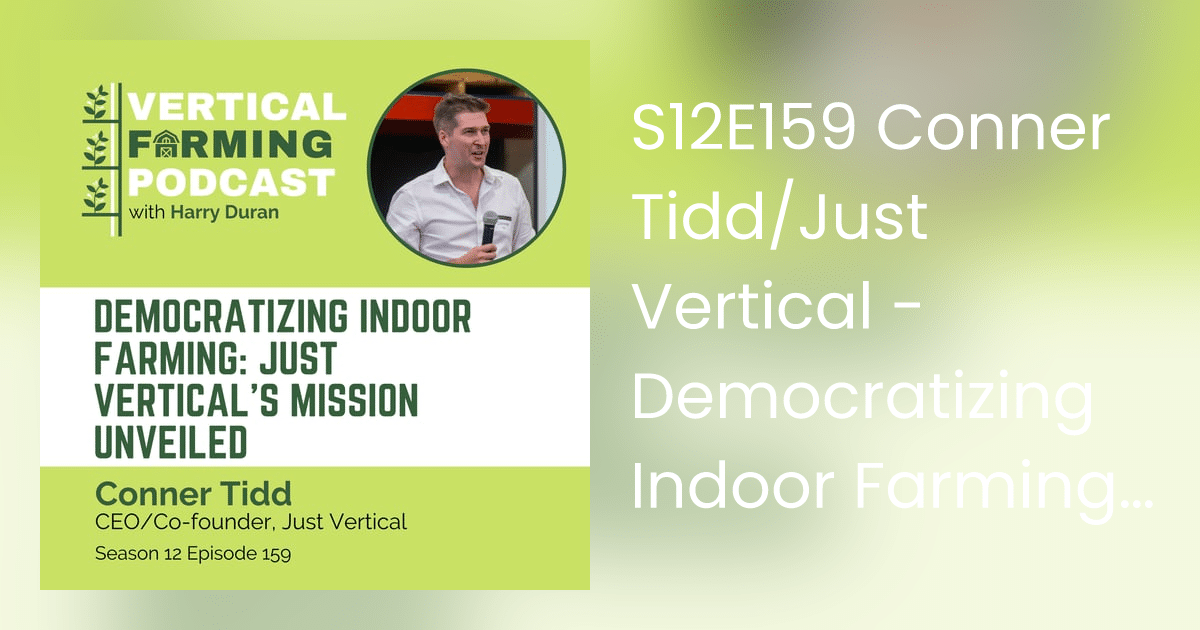Key Takeaways
- Founder Background: Conner Tidd, co-founder & CEO of Just Vertical early experience in agriculture, sustainability, and food access shaped his approach to indoor farming.
- Consumer to Commercial Expansion: Just Vertical began with home units and has scaled into building commercial vertical farms globally.
- Design and Accessibility Focus: Product design emphasizes aesthetic appeal and ease of use to drive adoption.
- Global Projects and Partnerships: Notable installations include projects in Moldova and partnerships with food banks and educational institutions.
- Industry Insights: Tidd highlights the importance of practicality, off-take planning, and collaboration for sustainable business models in vertical farming.
Early Influences and Agricultural Insight
Conner Tidd, Co-Founder and CEO of Just Vertical, discussed his roots in agriculture and sustainability in a recent interview with the Vertical Farming Podcast. He cited early experiences on organic farms and work in restaurant kitchens as formative, offering insight into food waste and sourcing challenges.
Tidd emphasized how exposure to food insecurity and sustainability issues during his academic and professional career, including a role at Bayer and a position at the Center for International Sustainable Development Law, directed his attention toward innovative food solutions.
Launching Just Vertical: Academic Beginnings and Market Fit
Just Vertical began as a capstone academic project focused on making vertical farming technology accessible to consumers. Early product development involved building functional prototypes with household materials, which evolved into the AVA and EVE indoor farming units. The designs emphasized compatibility with home décor and functionality to encourage regular use.
Expansion into Commercial Farming and International Projects
Following initial success in the consumer space, Just Vertical expanded to commercial applications, building indoor farms up to 100,000 square feet. A partnership with NewLeaf supports integration with IoT and control systems.
Projects include installations at food banks, restaurants, and educational institutions. A recent deployment in Moldova, near the Ukrainian border, supports long-term refugee food programs and skills development in collaboration with Global Medic.
Education and Community Engagement
Just Vertical has developed partnerships with educational institutions such as Seneca College, supporting both research and classroom learning. Their technology has been integrated into programs spanning from early education to postgraduate research, including studies on crop nutrient density and mental well-being benefits of greenery in indoor environments.
Supporting Commercial Growers with Practical Tools
Tidd emphasized Just Vertical’s focus on creating user-friendly systems that balance advanced technology with operational simplicity. The company provides support with infrastructure planning and financial modeling to ensure that customers are prepared for post-harvest operations and market access.
Product Overview and Differentiation
Just Vertical offers three main products:
- AVA: A high-end unit targeted at suburban homeowners.
- EVE: A smaller version designed for urban apartment dwellers.
- Eco Wall: A high-capacity vertical system capable of growing up to 88 plants, suitable for advanced home growers or small-scale commercial use.
Each product is designed to be compact, visually appealing, and easy to use.
Global Perspective and Market Positioning of Just Vertical
Tidd noted the importance of tailoring solutions to specific environments, including regions with high food costs, remote locations, or where customers have a strategic advantage such as on-site power generation or food service integration. Projects have been implemented globally, including in North America and Eastern Europe.
Emphasis on Collaboration in CEA
Tidd highlighted the importance of collaboration across the vertical farming industry. He welcomed engagement with other companies and emphasized that Just Vertical often refers customers to other providers when appropriate.
“Some of our greatest advancements came from advice from our partners,” Tidd said, noting that working together accelerates progress in the controlled environment agriculture sector.


